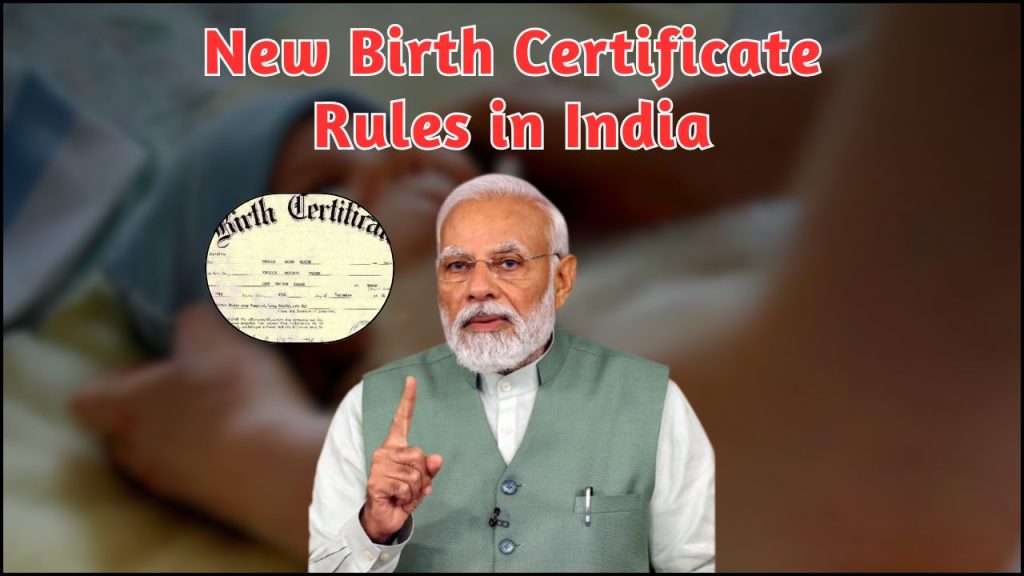
In a significant move that touches the life of every Indian citizen, the government has introduced sweeping changes to the birth certificate regulations under the Registration of Births and Deaths (Amendment) Act, 2023. Effective from October 1, 2023, these new rules aim to simplify documentation, improve digital governance, and streamline identity verification across various sectors. Whether you’re a parent, student, job seeker, or senior citizen, these changes are bound to impact you.
What’s New in the Birth Certificate Rules?
The revised guidelines have transformed the birth certificate into a centralized identity document, making it a single point of source for validating a person’s date and place of birth. This means that birth certificates will now be essential for a wide range of services and legal requirements.
Key elements of the new framework include:
- Single-source document: A birth certificate will now serve as the primary document for confirming birth details across both government and private platforms.
- Digital integration: All states are required to connect their civil registration systems with the central government’s unified digital database.
- Mandatory digitization: All birth records must be digitized and updated to be part of this central database.
- Wider acceptance: Digital birth certificates will be valid for everything from school admissions to passport applications.
‘One Nation, One Birth Certificate’ – Key Highlights
The government has officially launched the “One Nation, One Birth Certificate” initiative. Here are the standout features:
- A unified national database for real-time verification
- Mandatory digitization of birth records across all states and union territories
- A birth certificate is now compulsory for several services
- Stronger data security measures and improved public access
Services Now Requiring a Birth Certificate
According to the new rules, a birth certificate is now a mandatory document for accessing the following services:
| Service/Document | Requirement Status |
|---|---|
| School or College Admission | Mandatory |
| Voter ID Registration | Mandatory |
| Driving License Application | Mandatory |
| Passport Issuance | Mandatory |
| Aadhaar Card Enrolment | Mandatory |
| Government Job Applications | Mandatory |
| Marriage Registration | Mandatory |
| Property Registration/Inheritance | Mandatory |
This comprehensive list indicates just how central a birth certificate has become in the documentation process.
Impact on Parents and Citizens
These updates are designed to ease bureaucratic procedures, but they also make it crucial for every individual to ensure their birth records are properly maintained and digitized.
- New Parents: Hospitals are now instructed to directly upload newborn birth details into the central system, speeding up the issuance of certificates.
- Adults Without Birth Certificates: Those who lack a birth certificate must apply immediately through their municipal offices or via authorized online portals.
- NRIs and Migrants: Digitally issued birth certificates can be verified and used from anywhere globally, eliminating the need for physical copies.
Steps to Apply for a Digital Birth Certificate
Applying for a birth certificate under the new system is simple and digital-first. Here’s a step-by-step guide:
- Visit the Official Website: Access your state’s civil registration portal.
- Register or Log In: Use your mobile number or email to create an account.
- Submit the Application: Provide details such as the child’s name, parents’ names, and the hospital of birth.
- Upload Documents: Attach hospital discharge papers, identity proof of parents, etc.
- Track Status: Monitor your application progress in real-time.
- Download Certificate: Receive a digitally signed version via email or the portal.
- Use Across Platforms: Submit it for Aadhaar, voter registration, school admission, and more.
Benefits of the Updated System
The revised regulations bring a host of advantages for citizens:
- Simplified Identity Verification: Reduces reliance on multiple documents.
- Faster Services: Accelerates administrative processes like job applications and school admissions.
- Accuracy & Transparency: Centralized data minimizes errors and fraud.
- Easy Access: Birth records are now just a few clicks away.
- Digital Governance: Enhances efficiency and accountability in public service delivery.
Old System vs. New System – A Quick Comparison
| Feature | Old Rules | New Rules |
|---|---|---|
| Verification Process | Manual, needed multiple documents | Single, unified document – birth certificate |
| Data Management | Local municipal bodies | Centralized digital system |
| Scope of Use | Limited use | Required for many essential services |
| Accessibility | Physical copies only | Digital, real-time access |
| Fraud Prevention | Less secure due to manual processes | High security via digital authentication |
| Integration with Services | Inconsistent | Fully integrated with government systems |
No Birth Certificate Yet? Here’s What to Do
If you still don’t have a birth certificate, take the following steps:
- Visit your municipal office with supporting documents like hospital discharge summaries, school certificates, or an affidavit.
- Submit a delayed registration application with valid identity proof.
- After approval, your digital birth certificate will be issued and linked with other key documents like Aadhaar and PAN.
Expert Views & Government Statements
Officials from the Ministry of Home Affairs have emphasized that these changes aim to promote “Ease of Living”. Over 90% of Indian states and UTs are already integrating with the central portal. Additionally, data security is being strengthened under the Digital Personal Data Protection Act, 2023.
However, experts have urged the government to ensure rural awareness, so that even citizens in remote areas benefit from the reforms.
Check If Your Birth Certificate Is Digitized
To verify your birth certificate status online:
- Visit the Registrar General of India portal or your state’s civil registration site.
- Enter your name, date of birth, and place of birth.
- Download your certificate if it’s already available online.
Final Thoughts: A Step Toward Digital India
The new birth certificate rules represent a paradigm shift in identity documentation. By turning a basic record into a key identity proof across services, the government is moving closer to a “One Document, One Identity” vision.
It’s important for every Indian to proactively ensure their birth details are recorded, digitized, and linked to other vital IDs. This not only eases access to public services but also enhances the speed, accuracy, and security of documentation in India.
So, whether you’re applying for a job, enrolling your child in school, or planning international travel, your digital birth certificate is now more important than ever.



